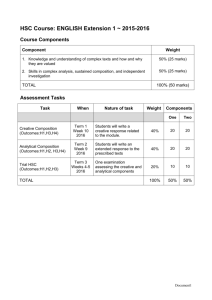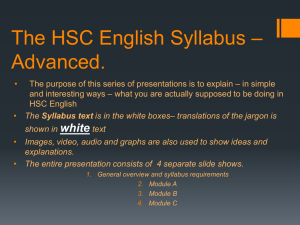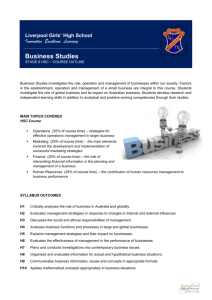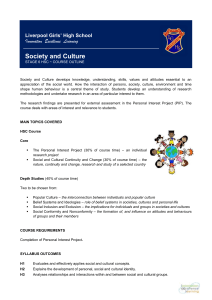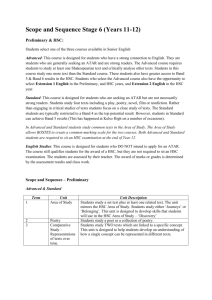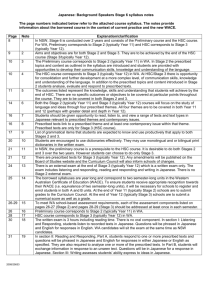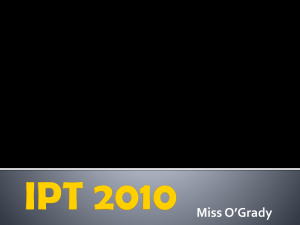answers to frequently asked questions on stage 6 english
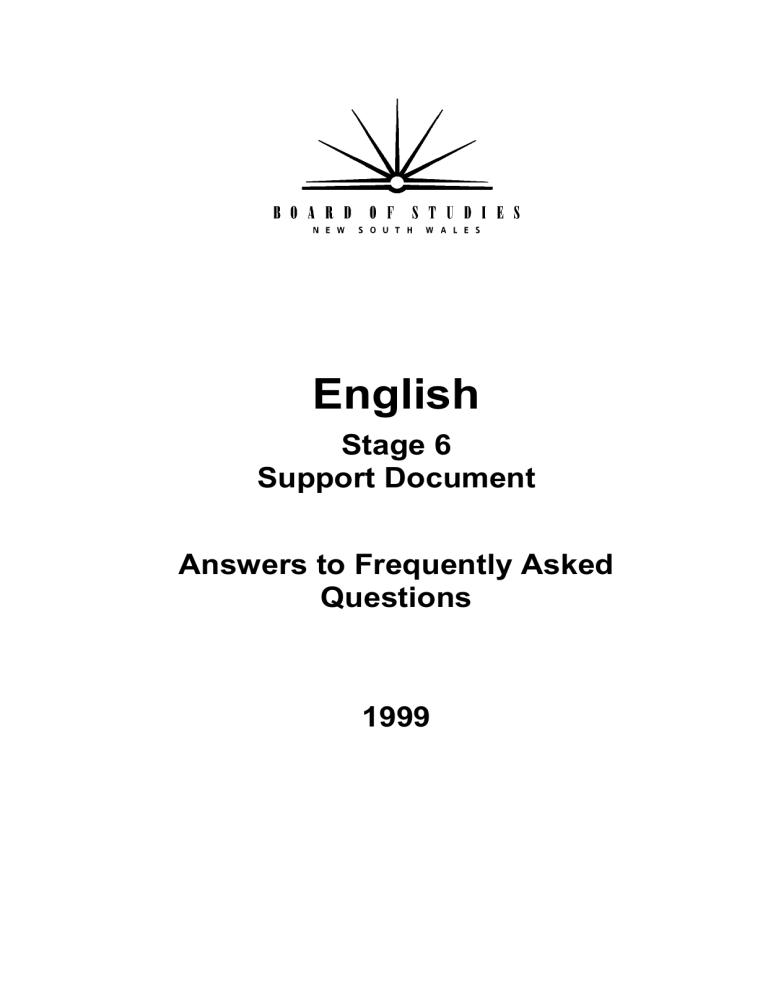
English
Stage 6
Support Document
Answers to Frequently Asked
Questions
1999
Answers to Frequently Asked Questions about Stage 6 English
How may the Preliminary Extension course and the Fundamentals of English course be delivered?
Students who wish to be awarded the HSC must study a minimum of 12 Preliminary course units and a minimum of 10 HSC course units. Students must satisfactorily complete the
Preliminary course before they can study the associated HSC course.
Within these requirements there is flexibility for schools to deliver Preliminary and HSC courses over Years 11 and 12 to suit their circumstances.
Students undertaking the English (Advanced) course who also undertake the English
Extension course/s must have completed the Preliminary English Extension course.
Typically this would be studied concurrently with the Preliminary (Advanced) course.
The Fundamentals of English course is a 120-hour Preliminary course only. It can be delivered over Years 11 and 12
Can students be given credit for having completed 60 hours of the 120-hour
Fundamentals of English course?
Students will be credentialled for 60 hours of Preliminary study in the Fundamentals of
English course provided they have met the requirements detailed in the recently published amendments to the English Stage 6 Syllabus (BOS Notice 64/99) and in the Board of
Studies Fundamentals of English Support Document.
Why does the English Stage 6 Syllabus state that ‘Preliminary electives are not to duplicate the presc ribed HSC modules’? (Syllabus pages 25, 43 and 62.)
Preliminary electives and units in the Stage 6 English courses are designed by teachers directly to meet the needs, interests and abilities of their particular students. A structure that focuses on particular skills, knowledge and understanding is more appropriate than broad modules in meeting the needs of specific groups and individual students.
Traditionally, Year 11 courses have been delivered through units of work. There is no need for this practice to change.
The English Stage 6 Syllabus uses modules as an organisational structure for delivery of the content of the HSC courses. Each of the modules establishes the parameters within which students can apply the synthesis of skills, knowledge and understanding developed through their Preliminary course. A detailed description of the scope of each module is given in the syllabus. While many of the required skills may be addressed in the
Preliminary course, it is the scope of the module that is not to be duplicated.
Why should students undertake the Advanced course?
The English (Advanced) course was designed to provide students with the opportunity to undertake the challenge of higher-order thinking in English (see syllabus page 12).
The English (Standard) and the English (Advanced) courses are made up of a common
Area of Study constituting 40% of each course with 60% made up of modules unique to each course.
The outcomes of the English (Advanced) course incorporate and extend beyond the
English (Standard) course outcomes. It is especially through the unique section of the
English (Advanced) course that students have the opportunity to demonstrate
2
knowledge, skills and understanding beyond the outcomes established for the English
(Standard) course.
The English (Standard) course emphasises reflection on texts and demonstration of the effectiveness of texts for different audiences and purposes. The emphasis of the English
(Advanced) course is on the analysis and evaluation of texts and the ways they are valued in their contexts.
Is there a limitation on the opportunity for candidates in the English (Standard) course to access higher bands/marks?
Students who undertake the English (Standard) course will have the opportunity to perform at the levels described in the higher bands, but they will be less likely to achieve in those bands than those students undertaking the English (Advanced) course.
The rewards for students undertaking the English (Advanced) course, however, will not be automatic. Success will depend on hard work and performance that demonstrates achievement of the standard at the highest levels.
What is the relationship between the new English Stage 6 Syllabus and related
Content Endorsed Courses?
Students undertaking the new courses in English are excluded from studying the CEC
Mass Media Studies because there is a significant overlap between this course and the study of media now contained within the new English syllabus.
The CEC Practical Writing Skills course remains available to students in Preliminary 2000 and HSC 2001 but will be subject to a general review during 2000, with any changes available for Preliminary 2001.
What is a prescribed text and what restrictions apply to the study of prescribed texts?
Texts are prescribed for HSC English courses in the document Prescriptions: Area of
Study, Electives, Texts, Higher School Certificate 2001 and 2002.
This document lists specific editions of set texts. Schools, however, may use any suitable edition if the specified edition is unavailable. Where a text is quoted in an examination the quote will be from the listed edition.
From time to time republished editions may contain some changes to the text. When this comes to the Board’s attention schools will be notified through the Board Bulletin .
The current version of Prescriptions: Area of Study, Electives and Texts can also be found on the Board of Studies website: http://www.boardofstudies.nsw.edu.au
The study of texts prescribed in any course for the Higher School Certificate may not begin before the completion of the Preliminary course. This exclusion applies to study in all
English Preliminary courses and to Preliminary courses in other subjects such as Drama. It also applies to the study of a prescribed text in another medium, such as the film version of a novel.
3
Who will ensure that schools study the specified types of texts?
Schools are responsible for having procedures in place to ensure that the correct texts and combinations of texts are taught. These procedures can be applied to monitoring of the types of texts to be taught in each of the HSC courses.
Will schools submit separate internal assessment marks to the Board for English
(Standard) and English (Advanced) courses?
Yes. Schools will submit separate marks reflecting the rank order and relative differences in student achievement for the English (Standard) course and English (Advanced) course.
The Board of Studies will place students’ achievement on the common performance scale for the Standard and Advanced courses once the moderated internal assessment mark is combined with the external examination mark The performance of students from both courses will be reported on this common performance scale.
There will be separate performance scales for ESL, English Extension 1 and Extension 2 courses and separate sets of internal assessment marks will be submitted to the Board for students undertaking each of these courses.
What correlation should there be between the HSC external examination mark and the internal assessment mark ?
There is no necessary degree of correlation expected between internal assessment marks and external examination marks. The internal assessment program should assess achievement of all outcomes of the course, some of which are not adequately measured by external examination processes. Maximising this correlation is not the goal of the school-based assessment.
In general, students will perform in a similar manner in the internal and external assessments, but schools should not expect a perfect correlation between these two measures. A very high correlation (close to 1) may mean that the internal assessment is too narrow and is simply replicating the examination. On the other hand, a very low correlation (close to 0) may mean that the internal assessment program is not adequately addressing those outcomes that are also measured by the examination.
What processes will be used by the Board to place Standard and Advanced students on the common performance scale?
The Standard and Advanced course students sit for the same Paper 1 and then either
Paper 2 (Standard) or Paper 2 (Advanced).
The distribution of marks awarded to students in Paper 2 (Standard) will be adjusted to match the distribution of marks awarded to the Standard course students in Paper 1. For each student, their adjusted Paper 2 mark will be added to their Paper 1 mark to give their total examination mark. The same approach will be used to obtain the examination marks for the students in the Advanced course.
By using this approach of relating the marks awarded in the discrete papers to the common paper, the marks of the students are expressed in the same ‘currency’ or, more technically, are placed on the same scale.
Once this is done the Board’s standard-setting procedure, involving teams of experienced markers using professional judgment informed by statistical data and
4
student responses, will be used to determine the band cut-off marks for the combined distribution so that a Band 6 awarded to a Standard course student is equivalent to a
Band 6 awarded to an Advanced course student, and so on. During this process checks will be conducted to ensure that if Standard and Advanced course students are awarded the same marks then their performances are of the same standard. The draft band descriptions may also be refined during this process.
This does not mean that the same proportions of students in the Advanced and Standard courses will be placed in any Band. Students undertaking the Standard and Advanced courses will receive the Band appropriate to the standard of achievement they demonstrate.
Will schools be given assistance to design assessment programs?
The new English syllabus provides teachers with guidance about components and weightings for Preliminary course assessment programs and describes the mandatory components and weightings for HSC courses.
The Board’s English Stage 6 Internal Assessment Support Document provides practical advice on the design and organisation of internal assessment programs and the design of assessment tasks and marking schemes.
The cross-sectoral LIG event 2 for English focused on assessment issues. The materials from this event are available on the New HSC website – http://www.newhsc.schools.nsw.edu.au
In November 1999 school principals and staff members with the responsibility for Stage 6 assessment policy and practices will have the opportunity to attend LIG event 3 on standards-referenced assessment in the New HSC. Participants will be provided with materials and strategies to support school faculties in reorienting assessment programs over the coming years to reflect a standards-referenced approach to internal assessment.
Further professional development support for the implementation of a standardsreferenced approach will be available to schools during 2000.
When will Draft Performance Bands for the ESL and Extension courses be published?
Draft performance bands for ESL have been published in the Board of Studies English
(ESL) Examination, Assessment and Reporting Supplement.
Draft performance bands for the English Extension 1 and English Extension 2 courses will be published in early 2000.
Are the Performance Bands fixed?
Following the 2001 examinations the performance bands will be further refined. This will be on the basis of student performance in the new courses before they become fixed descriptions of the standards.
5
How will the calculation of the Universities Admission Index affect students undertaking the Standard and ESL English courses?
All English HSC courses have been given Category A status.
Calculation of the UAI is a matter for the universities. It should be noted that universities make decisions on the scaling of courses on a year by year basis in relation to the quality of the candidature. The performance of a particular cohort cannot be predetermined.
What support material has the Board of Studies provided to assist the implementation of the English Stage 6 Syllabus?
The following support documents have been delivered to schools:
English Stage 6 Prescriptions: Area of Study, Electives, Texts, Higher School
Certificate 2001 and 2002
An Introduction to English Stage 6 in the New HSC
Annotations of Texts Prescribed for the First Time for HSC 2001/2002 (Board of
Studies website — http://www.boardofstudies.nsw.edu.au)
English Standard and Advanced Higher School Certificate Examination, Assessment
and Reporting Supplement
The New Higher School Certificate Assessment Support Document.
6
